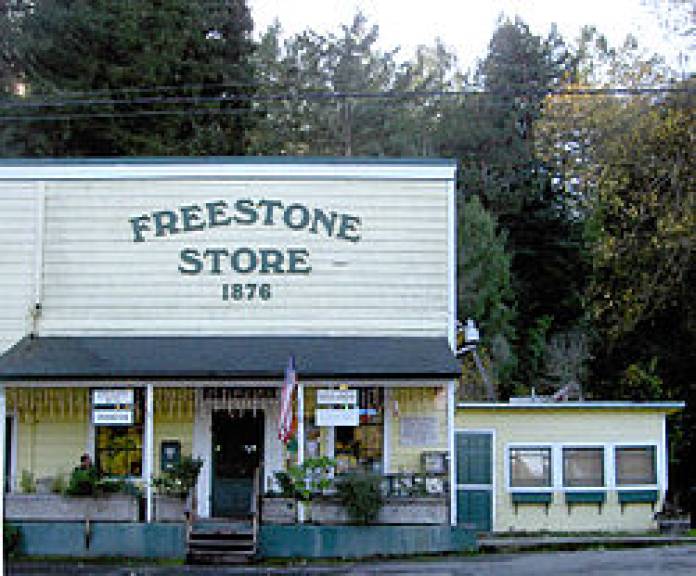Freestone, CA Local Info

Freestone serves as the gateway to the Bohemian Highway and holds the distinction of being Sonoma County's first designated historic district, a recognition bestowed upon it in 1974. This charming location is characterized by a cluster of well-preserved historic buildings housing various local establishments such as a cheese shop, winery, bakery, and day spa.
Originally, Freestone thrived as a lumber town, boasting a sawmill along the Salmon Creek. Over time, the area also saw the operation of a sandstone quarry. The introduction of railroad service further fueled economic activity, facilitating the transportation of lumber and produce to San Francisco. However, the closure of the railroad depot in 1930 marked a downturn in Freestone's economic fortunes, stalling its growth.
Freestone often serves as a popular pit stop for cyclists traversing the scenic west county roads and travelers en route to the Sonoma Coast via Bodega Bay, situated along the picturesque Bohemian Highway. This 10-mile, two-lane roadway meanders through Occidental to Monte Rio, offering breathtaking views along the way.
Glen Ellen holds a special place in literary history as the final home of Jack London, one of America's most beloved authors. London, famous for works such as "The Call of the Wild" and "White Fang," lived on a ranch in Glen Ellen during the early 20th century. Today, visitors can tour Jack London State Historic Park, which preserves London's former estate and offers insights into his life and legacy.
The park features "Jack London's Cottage," also known as the "House of Happy Walls," which was the author's residence during the latter part of his life. Visitors can explore the beautifully restored cottage, filled with artifacts, memorabilia, and personal belongings belonging to Jack London and his wife, Charmian London.
One of the most striking features of the park is the ruins of the Wolf House, Jack London's dream home. Unfortunately, the Wolf House was destroyed by a fire before it was completed, but visitors can still see the haunting remains of this once-grand structure.
The Park is nestled in the scenic Sonoma Valley, offering miles of picturesque hiking trails for visitors to explore. These trails wind through vineyards, oak woodlands, lakes, historical agricultural structures and open meadows, providing stunning views of the surrounding landscape.
Moreover, both the Bouverie Audubon Preserve and the Bouverie Wildlife Preserve just outside of Glen Ellen provide access to more than 500 acres of diverse landscapes, including oak woodlands, riparian woodlands, mixed evergreen forests, and chaparral.
And of course, indulging in wine tasting experiences in and around Glen Ellen is a beloved pastime for many visitors, adding to the allure of this charming destination. Benziger Family Winery and Hamel Family Wines stand out as leading examples of sustainable practices in winemaking within the region. Additionally, visitors shouldn't overlook Imagery Estate, celebrated for its exploration of unique varietals, and Eric Ross Winery, renowned for its exceptional Viognier and Syrah offerings.
Guerneville, nestled at the heart of the Russian River Valley, is a beloved resort town renowned for its scenic beauty, liberal atmosphere, and rich history. Situated in western Sonoma County along State Route 116, Guerneville offers a perfect blend of natural splendor and cultural charm.
The town traces its origins back to the 1850s when it was founded by the Guerne family. Built adjacent to the majestic Russian River, Guerneville boasts a lush environment that was once home to flourishing redwood forests. In fact, the valley was said to have had the greatest biomass density on the planet centuries ago. The area's natural allure attracted the local Pomo Indians, who named it "Ceola," meaning "shady place."
Guerneville's logging industry thrived in the late 19th century, fueled by the demand for lumber after the 1906 earthquake. Wealthy vacationers from San Francisco and beyond were drawn to the area's picturesque landscapes, with the San Francisco and North Pacific Railroad linking Guerneville to the Bay Area in 1877. Despite the decline of train service in the late 1930s, Guerneville remained popular among tourists who arrived by automobile.
The town experienced a cultural resurgence in the late 1970s when it emerged as a prime recreational destination for the LGBTQ+ community. Today, Guerneville is celebrated for its inclusive atmosphere and hosts various LGBTQ+ events and gatherings throughout the year.
In addition to its cultural vibrancy, Guerneville offers a wealth of outdoor recreational opportunities. Visitors can explore the towering redwoods at Armstrong Redwoods State Natural Reserve, enjoy water activities along the Russian River, or relax at Johnson's Beach, which features summer swimming and boating. The town also boasts LGBT-friendly clubs and bars, adding to its eclectic charm.